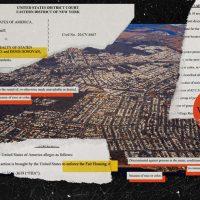A Staten Island brokerage and agent will pay $17,500 to settle a Department of Justice lawsuit alleging Black prospective tenants were not shown rentals in white neighborhoods, the agency announced Tuesday.
Village Realty of Staten Island and its former broker Denis Donovan agreed to the terms after Black and white testers were treated differently, according to the suit. The brokerage and Donovan have been out of the rental business since April 2019 and don’t plan to return to it, the government said.
But any Black victims of housing discrimination by the firm before then can tap into a $15,000 compensation fund set up as part of the agreement, which also includes a $2,500 penalty.
The department’s Civil Rights Division alleged in a lawsuit last fall that Donovan steered prospective Black tenants away from white areas and did not mention rent discounts available to them when he was tested for compliance with the Fair Housing Act in 2018. Donovan was Village Realty’s agent at the time, making the brokerage responsible for his actions, the lawsuit said.
The settlement, a two-year consent decree, still has to be approved by the U.S. District Court for the Eastern District of New York. In the decree, Village Realty and Donovan denied any wrongdoing. They did not respond to requests for comment.
As is standard in such deals, the agreement attempts to prevent future discrimination by the brokerage and agent. They must implement nondiscriminatory standards and procedures and hold fair-housing training should they re-enter the rental market. They also have to document compliance with the consent decree.
Read more



Donovan and Village Realty of Staten Island were tested by the department’s Fair Housing Testing Program between February and May 2018.
During the probe, in which people pose as prospective tenants to gather information about possible discriminatory practices, the department discovered that Donovan offered fewer units to Black testers. He showed them units in racially integrated neighborhoods but not predominantly white areas. He offered rental discounts to white testers but not Black ones, the suit alleged.
Donovan also told Black testers that they might be subjected to credit checks and have to sign disclosure forms to see available units, the suit alleges. White testers, however, had the opportunity to inspect available units the same day that they walked into the firm and without signing a disclosure form.
Housing discrimination has gotten more attention from New York elected officials since a paired-tester investigation by Newsday in 2019 found that agents were discriminating against prospective buyers based on race.
After the state Senate had to issue subpoenas to get agents to testify, dozens denied that they had engaged in discrimination. No agents in the Newsday report were disciplined, and some claimed no discrimination had occured, although the newspaper had recorded the conversations between testers and agents.
In response to the scandal, state lawmakers in February passed a series of bills to curb housing discrimination, including measures that require more hours of implicit bias training and establish an undercover testing program.
